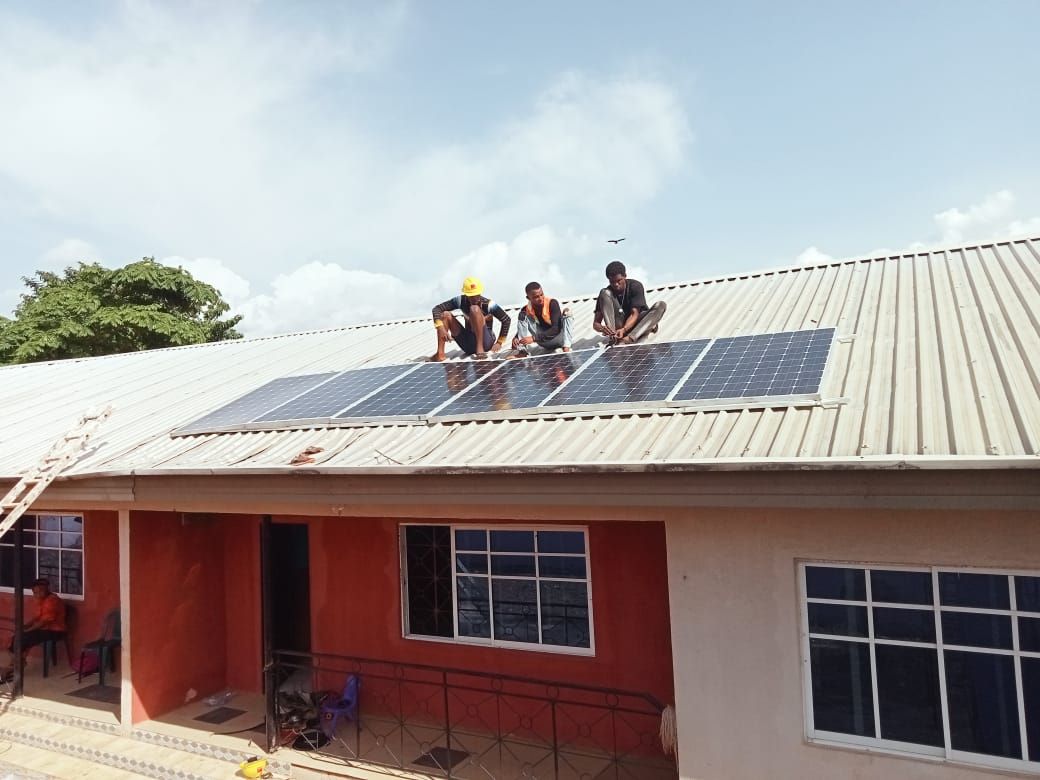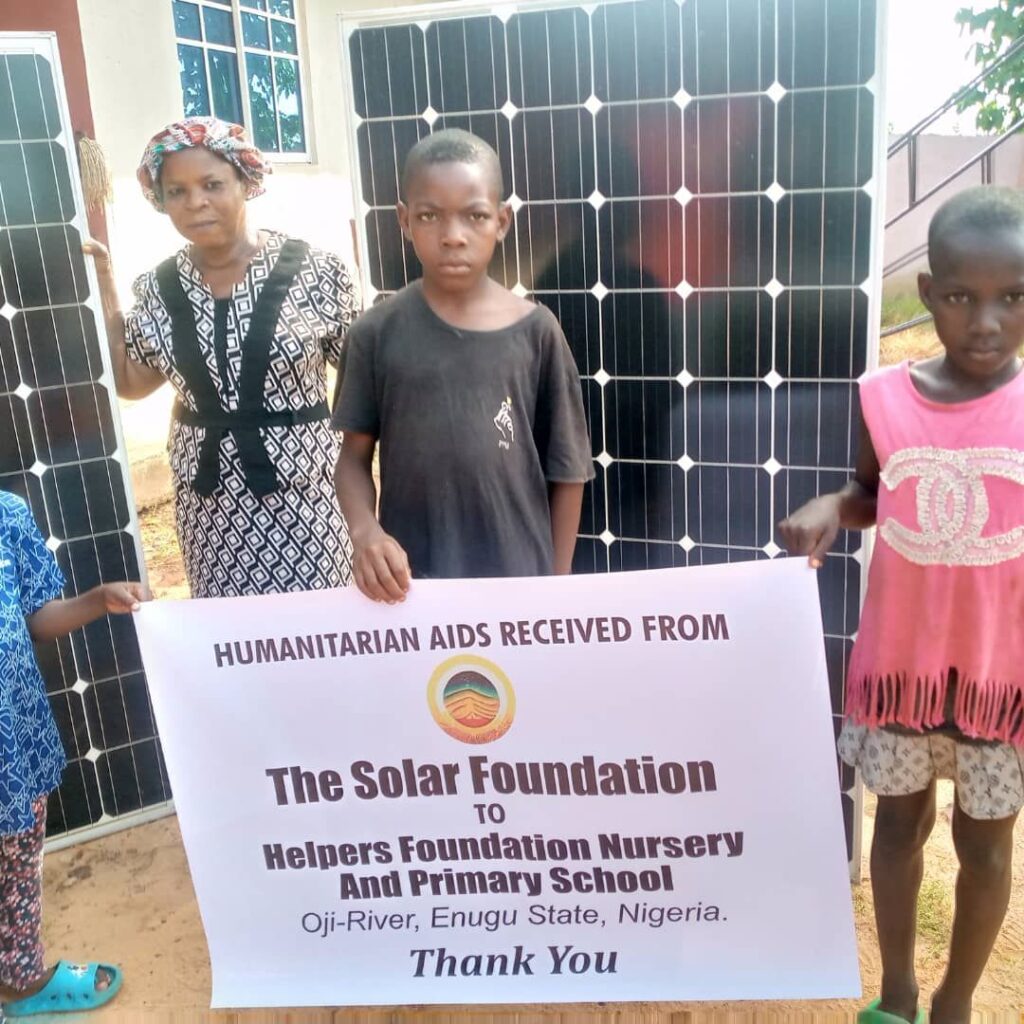The Solar System has come to alleviate the power deficiency in Nigeria. It is empowering almost all sectors in Nigeria. This article is focused on how the solar system is empowering education in Nigeria a study of The Solar Foundation humanitarian aid to Helpers Foundation school Oji-River in Nigeria. This article will highlight why we should use solar systems in Nigeria. Nigeria and the rest of African countries are blessed with so much sunshine, why not government exploit it to make electricity available for everyone?
Many programs have been implemented by various governments to curb this problem of inadequate power supply such as the Renewable Energy Master Plan (REMP) of 2005 which seeks to increase the supply of renewable electricity from 13% of total electricity generation in 2015 to 23% in 2025 and 36% by 2030, In 2017, the German Federal Ministry for Economic Cooperation and Development (BMZ) was involved in Nigeria Energy Support Program II which was co-funded by the EU.
Lean More How to donate to support our programs
 The overall term was from 2017-2018. This project provided nearly 16,000 people with access to solar power in rural areas. In 2018, The United States Agency for International Development USAID launched Nigeria’s four-year Renewable Energy and Energy Efficiency Project (REEEP) in partnership with Power Africa. It can be said that by connecting 16,600 solar installations, provision was made for about 261,938 citizens of Nigeria to have access to renewable energy, which will, in turn, lower their carbon emissions.To support the economic recovery in response to the COVID-19 pandemic, the Federal Government of Nigeria launched an initiative as part of the Economic Sustainability Plan (ESP). This program called Solar Power Naija was designed by the Rural Electrification Agency (REA), to create five million connections through an N140 billion financing program that will support private developers to provide power for five million households.
The overall term was from 2017-2018. This project provided nearly 16,000 people with access to solar power in rural areas. In 2018, The United States Agency for International Development USAID launched Nigeria’s four-year Renewable Energy and Energy Efficiency Project (REEEP) in partnership with Power Africa. It can be said that by connecting 16,600 solar installations, provision was made for about 261,938 citizens of Nigeria to have access to renewable energy, which will, in turn, lower their carbon emissions.To support the economic recovery in response to the COVID-19 pandemic, the Federal Government of Nigeria launched an initiative as part of the Economic Sustainability Plan (ESP). This program called Solar Power Naija was designed by the Rural Electrification Agency (REA), to create five million connections through an N140 billion financing program that will support private developers to provide power for five million households.
The Federal Government of Nigeria, in conjunction with the Central Bank of Nigeria (CBN), introduced a solar intervention fund that will offer obligors access to credit facilities that will not exceed a maximum of N500m maximum, aiming to provide affordable electricity to rural dwellers. These programs are targeted to curb the problems of shortage of power supply in the country. The government has invested much in the area of solar systems as a means to bridge the gap in the supply of power by the Power Holding Company of Nigeria. This article is focused on how the solar system is empowering the educational sector in Nigeria
WHY SOLAR SYSTEM IN PRIMARY AND SECONDARY SCHOOLS IN NIGERIA
The Climate of Nigeria is such that affords a vast amount of sunshine per day. It is recorded that Nigeria has an average sunshine hour per day of 6hrs and the reserve estimate is 3.5-7.0KWh/min 2 days. This is why the solar system is a viable alternative to the National grid. The educational sector is a major sector of any economy and in Nigeria and the use of solar systems to power the sector will go a long way in improving the overall performance of the sector.
Solar System Fit well in Roof
Primary and Secondary Schools in Nigeria mostly have a flat roof that is very ideal for the installation of solar panels. They also provide plenty of open, unshaded space for solar panels to work to their highest potential, these roofs are also unlikely to feature sensitive materials, like wood shingles, which can make a solar installation more challenging.
Solar Systems cut down operating cost
Electricity prices have risen over the past ten years. Because they use a great deal of electricity, primary and secondary schools have been some of the primary victims of these price hikes. Fortunately, solar power is a free source of energy, found in abundance throughout the world, and advanced technology and skilled installers have made it even more accessible for institutions.
Primary and Secondary Schools in Nigeria can have access to some of the least expensive (in terms of cost-per-watt) systems available. As systems get larger, their cost-per-watt price falls. This means nursery, primary and secondary schools in Nigeria can enjoy affordable power without the guessing game of the grid.
Solar System Boost Enrollment
Solar power is cutting-edge and attractive to eco-minded students, teachers, and supporters. As such, a nurseries, primary and secondary schools that installs a solar panel system could easily see an increase in enrollment. This is especially true in competitive areas, where having solar panels on a building could be the factor that distinguishes one school from its competitors in the eyes of potential enrollees. A 2022 UNESCO report noted that approximately 20 million Nigerian individuals of its approximately 200 million population are not enrolled in school. This amounts to 20 percent of Nigeria’s entire population. When modern students choose schools, many of them look for options that offer environmentally-conscious practices, renewable power, and eco-friendly facilities. As such, many primary and secondary schools have even established sustainability offices designed to drive the institution’s green initiatives forward. When these things all come together at a single school, it’s easy for that school to gain a reputation for innovativeness and creativity. Not only do solar panels produce energy, but they also stand out as a unique social and cultural symbol. Many schools in rural areas have enrolled many students in school due to the installation of solar power in their schools. One such school is Helpers Foundation Nursery and Primary School, Oji River Enugu State where the installation of solar power boosted the enrollment of out-of-school children back to school, and other children as well in other schools also enrolled because the provision of steady power supply in the school has improved the teaching and learning of the practical computer and ICT related practical and parents are always happy to see that the wards or children are getting the adequate learning as it pertains to information and technology.
Solar Power Provides Reliable and Unlimited Energy
For primary and secondary schools both in urban and rural areas alike, solar power systems offer a dependable source of unlimited energy. While fossil fuels are a finite source of energy, solar power is not. Designed to work on cloudy days, in part sun, and even in wintery environments, solar panels can generate a significant amount of power for universities and schools that install them.With reliable and
HOW THE SOLAR FOUNDATION IS HELPING CHILDREN TO HAVE ACCESS TO DIGITAL LEARNING.
Various schools from nursery, primary, and secondary are improving in all spheres of their learning with the introduction of solar systems in schools. The United Nations Sustainable Development Goal provides in goal No 7 to ensure access to affordable, reliable, sustainable, and modern energy for all. The Solar Foundation, an NGO is committed to bringing UNSDG to full success. Its goal is to advance equitable access to clean, affordable solar energy and storage including microgrids; develop a transparent open-source model to accelerate solar solutions using web3; to research and implement microloans or social investment for a regenerative, sustainable source funding, so that, they can empower more and more communities.
How the solar system is empowering education system in Nigeria
The Solar Foundation installation of solar power at Helpers Foundation Nursery and Primary School has given the school 24 hours of uninterrupted power supply, wherein students now learn at a faster pace unlike before. This donation has given the teachers a massive moral boost in teaching as well as enabling the environment to do their job. They can now charge their phones and also teach the students digital skills as well as basic computer training. The Solar Foundation is impacting lives and other organizations may as well collaborate with them to bring about the achievement of the United Nations goal of sustainable modern energy.
Where there is no adequate supply of power, schools should embrace the solar power supply for the optimum performance of their students in all competitive areas of academics. A call is extended to the governments and NGOs to render support to some non-government organizations running educational programs in rural areas. With the installation of solar panels in those schools, there will be a massive inflow of out-of-school children back to school and a proper and adequate environment will be created for a better learning experience.
The Helpers Foundation Nursery and Primary School Oji River Enugu State of Nigeria is one such school where students go to school free of charge in Nigeria. The foundation is working towards creating opportunities for children to achieve SDG 4 through its initiatives in Nigeria. The installation of a Solar system in the school has most especially given the school a new ambiance where learning is not only conducive but enjoyable. The Helpers Foundation school now has 24 hours uninterrupted power supply through the intervention of The Solar Foundation.
How the solar system is empowering education system in Nigeria
The tropical climate of Nigeria with a heavy dose of sunlight generating heat for school children has been eradicated with solar power turning the blades of the ceiling fans and standing fans of the classroom and lighting the whole classroom making the school and learning a fun activity. The Solar Foundation intervention in Helpers Foundation School has helped us to start teaching children basic computer training and digital skills. In the era of the digital revolution, it is important that everyone have access to computers to improve.
A call is extended to all government, NGOs, international organizations, agencies, and well-meaning individuals, to work towards collaborating with Helpers Social Development Foundation to provide solar systems in all our nursery, primary and secondary schools in Nigeria both in urban and rural areas to enable a good environment for students to learn since education is the bedrock of a strong and robust economy. Installing solar systems and computers in all public schools will help children to acquire practical digital knowledge while in school because millions of vulnerable children in public schools do not have access to computers at home.

